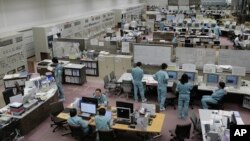The operator of Japan's fuel reprocessing plant said Monday that it was postponing the plant's opening to as late as September 2018, citing regulators' lengthy inspection procedures and time needed for safety upgrades.
The Japan Nuclear Fuel Ltd. said it was delaying the targeted completion of the Rokkasho reprocessing plant, which separates plutonium from spent fuel for reuse as fuel, by as much as 2 1/2 years. The delay-plagued plant, initially set for launch in 2000, was most recently set to open in March 2016 following a series of technical problems.
JNFL president Kenji Kudo told reporters at the company's headquarters in Aomori, in northern Japan, that a separate plant to produce plutonium-based fuel had been delayed until sometime during the first half of fiscal 2019.
Japan already has about 47 tons of plutonium - 11 tons at home and the rest reprocessed in Britain and France - but no use for it, with most of its reactor fleet offline since the 2011 disaster at the Fukushima nuclear plant.
The plutonium is used to generate electricity, but has raised proliferation concerns because the material Japan has is enough to make thousands of nuclear bombs.
While Rokkasho's delay could be a temporary relief for those concerned about nuclear proliferation, it also means spent fuel rods that are already filling up storage pools in Japan have nowhere to go.
Officials are promoting nuclear restarts in part as a way to burn plutonium and reduce the stockpile.
Experts including Frank von Hippel, a Princeton University theoretical physicist and advocate of nonproliferation, have urged Japan to stop spent fuel reprocessing. Von Hippel proposes storing spent fuel in safer and highly protected dry casks instead of uncontained cooling pools as an alternative until a final waste repository is found.




